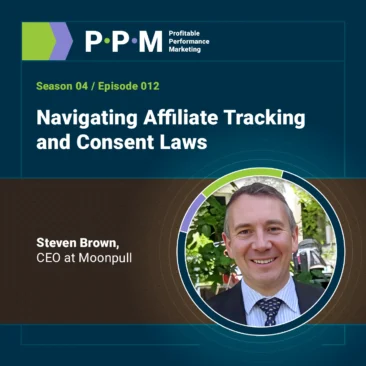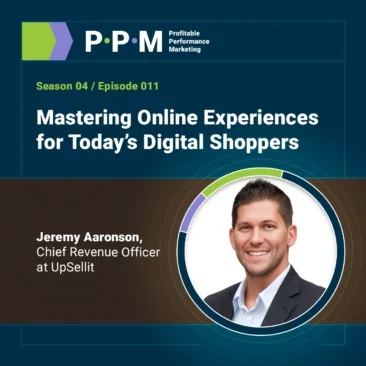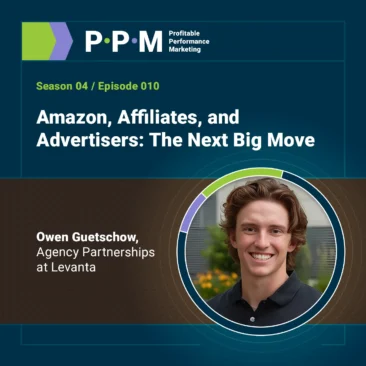Season 03 / Episode 016
The Complex World of Affiliate Compliance – Get To Know Your Liabilities
Note: if you get only a 30 second preview, please log into your Spotify account, or find us on one of several other podcast services.
Summary
In this episode, Jamie discusses the three main areas of compliance every affiliate program needs to be aware of: network, regulatory, and affiliate compliance.
For more in-depth coverage of the issue, here are some resources from the PMA: https://thepma.org/?s=FTC
Listen
Share
Notify
Transcript
[00:00:48] Jamie: Well, hey listeners, welcome to the Profitable Performance Marketing podcast. I’m your host, Jamie Birch and founder of JEBCommerce, your award winning affiliate management agency. Today, we’re going to have a solo podcast. It’s just me. Me and you talking about compliance. The exciting and sexy world of compliance in your affiliate marketing.
[00:01:10] But before we get into our episode, want to tell you about something we’ve done different this year. Our new CEO, Jake Fuller, has spearheaded different packages that are available to you now.
[00:01:21] And if you go to JEBCommerce.com/elements, you’ll see the four packages that we have. One thing that’s been missing in the agency world for affiliate management is transparency on how much these things cost and what you get for what you’re paying. So we’ve tried to alleviate that. We now have four packages available from our Bronze all the way up to our Platinum.
[00:01:43] And the Bronze is really, you need some help but you’re not in a spot yet where you need top shelf service. You may not have paid placement budget that we need to manage for you or anything like that. We think this is a really great way for you as the advertiser to fully understand what you’re getting from an agency and what that is costing you.
[00:02:02] So head over to JEBCommerce.com/elements and check out those packages. If you are looking for help. To grow your affiliate program.
[00:02:11] Let’s talk about compliance, the sexy world of compliance. What am I talking about here? Well, first, do you know there are things you need to be compliant in, in your affiliate program?
[00:02:22] So I’m primarily talking to advertisers today, but there are things you need to be compliant in. Yes, you do have to be compliant. So let’s talk about three things. There’s contractual compliance you have with your network, which then goes to compliance with your affiliates.
[00:02:37] You have regulatory and legal compliance issues with the FTC that we’re going to talk about. And then you have are your affiliates compliant with your terms and conditions? So we go both ways here. You are compliant and are your partners compliant and what you need to do to check that. So let’s talk about the contractual and the legal stuff.
[00:02:56] So contractually, this is a part that advertisers really sometimes miss. Once they sign their contract with the network and everything is tracking on that launch date. There’s a lot of misconception and just naturally how it works is we don’t really have to do anything else. We’re going to pay for what we want.
[00:03:14] And all those things, but that’s not actually the case. You do have things you are contractually obligated to be in compliance with a hundred percent of the time or close to it. So one is tracking. How often are you testing your tracking? Is that testing happening or are you only doing it when you notice there is a problem?
[00:03:33] You have a contractual obligation and I’ve read network contracts and been a part of negotiating contracts for 20 years and honestly, probably over 200 different affiliate programs and advertisers with maybe 10 different networks. All of them that I can remember have a spot in there that you have to make sure that your program is tracking because they all make money.
[00:03:57] Affiliates make money off of those orders and the networks make fees off of those orders. So you have to be in compliance with your tracking. You have a legal liability here. So if you’re an affiliate manager and you haven’t tested your tracking, there’s a blog post and a podcast episode about tracking testing.
[00:04:16] Go check that out at JEBCommerce.com, click on the media section and search the blog and search the podcast section for our ways of testing tracking. So you have to be in compliance with that. You have to be in compliance with the reporting you’re providing the affiliate as well. That goes hand in hand with the tracking and then your payments.
[00:04:36] You have to be in compliance with your payments. That’s usually pretty easy because when payments are due and the network or the affiliates aren’t getting them, they’re going to let you know. But it’s really that core, that foundation is on tracking. And what I will say, what I have seen is the networks really won’t come to you until there’s a problem and now you have a liability you have to take care of.
[00:04:59] The best thing is to get into a regular tracking testing procedure so that you don’t ever have any of those issues. If you’re an affiliate manager, it’s in your best interest anyway, to make sure you’re tracking those things.
[00:05:12] So now let’s go to regulatory and legal. The FTC, Federal Trade Commission, has authority over advertising and at its core, that’s what we’re doing here. Right? In affiliate marketing, we’re doing advertising.
[00:05:25] So the FTC has their advertising regulations that you have to share that this is an affiliate link when it’s not obvious. Most shopping sites and coupon sites it’s pretty obvious that this is a shopping endeavor. What really happened, quite a while ago actually, when influencers and content creators started coming out and I actually think that something the Kardashians did led the FTC to do this.
[00:05:52] They were out talking about a product and in one of their videos, the social media posts… I am not very familiar with that family or what they do other than you hear about it all the time. But they had a post about a product, and it wasn’t clear that they were getting any remuneration for that.
[00:06:09] So, did they really just like that product or were they getting paid? And the FTC basically says if it’s confusing, then it needs to be stated clearly what that is. And so if there’s any remuneration and that is any commission paid, any payment made, whether in product or in dollars, anything of value exchanged for someone posting a link or sharing a product review or anything like that, you have to, the affiliate has to say, and have a disclaimer on the site that if you click through some of these links and buy some of the products we may, and do get paid a commission on that.
[00:06:48] Basically what they want to do is make sure that you’re not out there and affiliates aren’t out there saying, “I love this product. It’s so great”. And they’ve never used it and they don’t mean it. And they’re just getting paid for that. So they want the consumer to know, and their job is to protect the consumer. They want the consumer to know whether you’re getting paid to say what you’re saying.
[00:07:06] There is a process we use every site has to have a disclaimer. You can go to the FTC to get that and you can go to the PMA, the Performance Marketing Association, ThePMA.org, go check them out. They have a lot of amazing resources to help you figure out what you need to do.
[00:07:23] But basically all those sites need a disclaimer that some of these links on this page, or on our site, we get paid if you shop through. It’s pretty simple, but it needs to be clear. That being said, and we have other we have, you can go search our blog. You can search our podcast for information on the FTC guidelines.
[00:07:42] But, what I want you to remember here is you have to be in compliance. If the affiliate goes out there and they do, 30 videos on TikTok about your product, and they’re not disclaiming to the consumer that you’re paying them a commission, if anyone buys through the links they’re sharing, then the affiliate’s going to get in trouble.
[00:08:02] The advertiser is going to get in trouble. And if the FTC really wants to make an example out of you, the person in charge of that campaign at the advertiser may be named in that action as well. It can get a little scary, so you have to make sure you know what this is, you are ensuring your affiliates know what this is, and you’re checking.
[00:08:24] Now the FTC, and this is what I found with most government agencies, including the IRS, believe it or not, if you’re trying to do the right thing, they’re going to give you a ton of leeway to make adjustments. And I own another organization that does a lot of work with the government, and I’ve always found that to be the case.
[00:08:41] If you’re trying to do the right thing, they’re going to help you. They don’t expect from my conversations with them in the past, they don’t expect you to check every site every day in perpetuity to make sure everyone’s in compliance. What they want to know is you have a process that will most likely catch anything that isn’t in compliance relatively quickly.
[00:09:04] What does that mean? Well, it’s a little ambiguous, but here’s what we do. And I’m not an attorney. Let me give you my disclaimer. I’m not an attorney. I’m not an FTC expert, but I run an agency where this may come up. What we do is we have a process and every Friday we pick either five or 10 sites per client and we go out and review their sites and we make sure, do they need the disclaimer? Are they using it? And is it strong enough?
[00:09:29] And if we look at those sites and they need a disclaimer and they don’t have it, then we reach out to them and let them know about this law. We’ll send them links that will be in the show notes here and we’ll inform them of that. We also, and this is a great idea for anybody, we sign up for all our affiliate partners in all our clients for their emails, and any other marketing activities they have.
[00:09:52] You may have already seen this disclaimer. This is not a new thing. Many of the mature affiliates who do a really good job they’re already doing this. And so you’ve seen that many of the media publishers, that’s probably where I see it most prominent. They’re sometimes the largest organizations and they want to stay out of trouble.
[00:10:08] Every Friday in our planning process we pick five or 10 sites at random. We make sure they have compliance and we keep track of who we checked and what the results were so that if the FTC ever came to us for a particular advertiser, we would be able to go back and say “no, this is what our checks did.”
[00:10:26] And if that process isn’t tight enough, they may ask you to update that, but you do have to be in compliance. There have been lawsuits and people have lost and they’ve lost money and they’ve lost jobs. Now, I’m not saying this to scare you, but I want you to know this is one of the areas that you need to be in compliance with.
[00:10:44] You can type in FTC affiliate disclaimer, and I’m sure Google will have a whole lot of results, but I definitely want you to go to ThePMA.org and check that out. I will include any relevant links at JEB for this subject and at the PMA. Check out these show notes for that.
[00:11:01] That’s really the legal and contractual stuff you have with the networks, but one thing I do want to point out is it’s really good to get in a process to go look at your affiliate sites often. And I know, that may seem to you and to the experienced affiliate managers listening, that may seem really basic.
[00:11:19] That you would have to go look at your sites. I’ll tell you what, there’s a lot of affiliate programs and the person in charge has never gone and looked at one of their partner sites, or they haven’t gone and looked in a really long time. So this FTC compliance, it can put a little more teeth, a little more impetus, a little more pressure for you to go look.
[00:11:37] But while you’re there, go check all the other stuff out. How are they promoting you? What are competitors doing? What spots on the website could you be in that you’re not that you should be in? So I use this as an opportunity and our staff does here at JEB to make sure we know what the affiliate has going on. We know what the opportunities are for each of our clients and that everything is copacetic with the FTC.
[00:12:02] So now you’ve made sure your program is compliant. Now you got to figure out, are your affiliates compliant with your terms and conditions? Have you read your terms and conditions? I know I ask that kind of question a lot, but have you? When’s the last time you updated it? Is it in line with the types of things you allow and don’t allow in your program?
[00:12:20] You can go through your affiliate agreement and things that should be in it and we’ll probably do another podcast of things that should be in your terms and conditions, but you should have a section on what’s allowable permissible in your SEM.
[00:12:38] Can affiliates engage in search engine marketing, in paid search marketing? How can they do it? What can’t they do? The FTC disclaimer and compliance that should be in there as well. Your promotional compliance. Can they promote any promotion that they have? Do they only promote ones available through the channel? Are there no promotions available? What kind of promotional compliance do they need to be in? Is that even in your agreement? Are there regions where they can promote and where they can’t?
[00:13:08] Pricing. A lot of times we’ll deal with advertisers that resell other brands and other manufacturers and they’ll have pricing agreements where they can’t go as low as this price or that price. So, you may have to include some pricing language in your affiliate agreement and then marketing activities outside of SEM. What other marketing activities are they allowed to engage in? Or what aren’t they allowed to engage in?
[00:13:33] Most of the agreements I write and review, we just tell them what they can’t do because the affiliates are amazing at coming up with new ways to build audiences and reach audiences. I don’t want to restrict them from that, but there are things that each client, each advertiser isn’t okay with.
[00:13:49] I want to make sure that they know what they can and can’t do. So now that I have that in all my agreements, I have to regularly make sure that the affiliates are in compliance with that. So do you have a mechanism to do that? We do. It’s our Friday planning process and it’s our month end review. Now that month end review is an internal thing we do every month for every single client.
[00:14:12] We look at performance, who’s up, who’s down. We actually go through those affiliates who are performing, those affiliates who didn’t perform but used to, and new affiliates that are performed, we go and look at their websites and we make sure again: FTC compliance, and we make sure all the marketing activities are compliant as well.
[00:14:31] It’s not just looking for negative things. Like I said earlier, we also use this opportunity to look through and see what else they have going on that we can get into. What are competitors doing that maybe we should be involved in? What kind of intel can we gather to influence the strategies and tactics that we’re using to reach the growth goals for our clients? And is there anything competitively macro or micro economically that we can share with our team and our clients that will help them achieve their goals as well?
[00:15:02] It doesn’t sound very sexy. It’s not something everyone… “oh, I can’t wait to do this.” But it is at the core of making sure your program is run really well, and you’re not missing anything that’s going to create a liability for you, but you’re not missing any opportunities to grow your program.
[00:15:20] So there you have it, compliance in the affiliate channel. We talked about contractual obligations you have with your network. We talked about FTC compliance and legal compliance, regulatory compliance. And then we talked about making sure your affiliates are compliant with you.
[00:15:38] So do you have any questions? Any comments? Definitely post them anywhere that allows comments on this podcast episode, but also send them over to gethelp@JEBCommerce.com. We’d love to know what you thought of this podcast episode.
[00:15:52] If you found it valuable, please go and share it, whether that’s Facebook, LinkedIn X or anywhere else. Maybe you just know someone who needs to take care of this issue and they need this episode, send that over to them. And maybe you receive this episode from someone, you need to do it, you don’t really know what to do. Well, email gethelp@JEBCommerce.com. My team will jump on the phone with you for free. No obligation at all and help you walk through this issue. That’s at gethelp@JEBCommerce.com. So please share this podcast. Really appreciate you listening today.
[00:16:26] If you need help with your affiliate program, JEBCommerce is an award winning agency. We just celebrated our 19th year in business, 19 years. When I started this 19 years ago, I had no idea where it would take us. We’re really glad we’ve been able to service some amazing clients and can’t wait to celebrate year 20, that’ll be pretty exciting.
[00:16:47] So anyway, thank you for listening. Don’t forget to share, and hey, one of the best things you can do to help get the word out about this podcast is to leave us a five. Star review. Whether you listen on Apple Podcasts, or Spotify, or a different podcast player, go leave us a five star review, tell us what you think.
[00:17:04] All right. Well, thank you for listening to the Profitable Performance Marketing podcast and today’s topic of compliance. You guys have a great day.
Transcript Toggle





